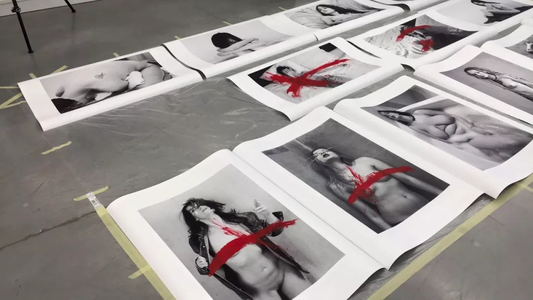transgress noun
1) To violate a command or law: SIN
2)To go beyond a boundary or limit
When Polish photographer Rafal Michalak was a child, there was no such thing as cell phones, the borders of his country were occupied by the Soviet Union, and film was still processed in dark rooms. In this rapidly evolving world, finding meaning in constant change can be a painful process. From self-harm to sexual deviance, Michalak’s artwork explores the search for identity in the modern age through our personal and cultural transgressions.

“As herd animals, we strongly feel the need to belong,” Michalak claims. “At the same time, and paradoxically, we want to distinguish ourselves from others, to become unique. This is probably the most common cause of transgression.”
SECRETS OF MY STOCKHOLM
When the only promise of life is change, trying to belong can prove physically and emotionally painful. In his performative series titled “Autogression,” Michalak photographed subjects hanging in the air by their skin, impaling their bodies with hooks, and shoving needles through their cheeks.

Although a casual observer may dismiss this as mere “shock art,” Michalak finds his own process aligned with the psychoanalytical philosophies of Polish psychiatrist Jozef Kozielecki and nihilistic writer Emil Ciora, whose work centers around issues of suffering, decay, and nihilism. Within the framework of these larger concepts, “Autogression” confronts the barriers we build around us to hide our physical and mental suffering from a world in constant flux, and through photography, Michalak exposes this hidden vulnerability without fear of shame.
shame noun
1) A painful feeling of humiliation or distress cause by the consciousness of wrong or foolish behavior
To Michalak, fear of shame is the ultimate factor that prevents us from intentionally transgressing our personal and cultural boundaries. “We all make transgressions, often not realizing that the border has just been exceeded,” Michalak states. Ironically, the definition of shame differs between cultures and individuals, and is always changing as society constantly transforms itself. Michalak explores this concept through his sexually charged project titled “SHAME,” where nude females willingly recline or recoil in front of his camera.

when looking for subjects to shoot, he finds himself attracted to woman with blemishes, or something unusual that they would normally hide. “It is very important for me to understand how they feel about the problem,” he states. Although the erotic pictures are intimate in nature, Michalak intentionally hides their eyes with violent slashes of red paint, scratch marks, and burn holes. This creates a feeling of distance that directly contrasts with the open vulnerability of the naked women, whose personal acts of physical and social transgressions directly challenge the nature of our constantly changing reality.
“What would happen if a man’s face could adequately express his suffering, if his entire inner agony would be objectified in his facial expression? Could we still communicate? Wouldn’t we then cover our faces with our hands while talking? Life would really be impossible if the infinitude of feelings we harbor within ourselves would be fully expressed in the lines of our face. Nobody would dare look at himself in the mirror, because a grotesque, tragic image would mix in the contours of his face with stains and traces of blood, wounds which cannot be healed, and unstoppable streams of tears.”
– Emil Cioran, On the Heighst of Despair
SHAME
By exposing the latent mental and physical anguish we all keep hidden from one another, Michalak’s photographs act as a tinted window into his subject’s psyche and serves as a shadowy mirror into our own subconscious struggle to belong.
This paradox between mirrors and windows is intentional, and reveals itself as a theme throughout his work. Photography as a medium provides no definite explanations; only fragments of a broken reality. But whose reality does it reveal: the viewer, the subject, or the artist? Through his artistic process, Michalak offers no clear answers to these questions. He prefers to blur reality with fantasy, and believes that by transgressing these boundaries we can experience each other’s perspectives more clearly.

Do not look for my heart anymore; monsters have eaten it.
- Charles Baudelaire, The Flowers of Evil
To Michalak, “Life and death are two sides of the same coin.” So if the only guarantee in life is change, then the only promise of death is permanence. Michalak has terminal cancer, and is nearing the end of his lifelong career as an artist. When asked if this has affected his work, he claims, “Despite technological progress and the development of science, I cannot talk about reality without reference to the fact that everything has its origins, develops, and has its end.”
As a man who has explored the depths of loneliness from living in a world that is always changing around him, Michalak is preparing for his permanent retirement in style. His latest project, “Necessary Losses,” features a series of self-portraits taken inside a coffin made specifically for his funeral.


Much like an ancient pharaoh who clings to his worldly belongings in the hopes they will remain with him for eternity, Michalak ironically depicts himself holding various symbols of power such as: a naked woman, a Bible, a Buddha, and an iPhone. Perhaps these symbols help us to cope with the one true reality of life: That nothing in this world is permanent except death, not even our ideas.
Later this month, Michalak will be hosting a new exhibition in Chengdu appropriately titled, “Between Mirrors and Windows” as well as photographing subjects for a new edition of his “SHAME” photo series. We look forward to hosting him here, and hope you get the opportunity to check it out!
——Rorí F Mencin















Opmerkingen